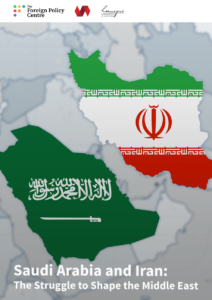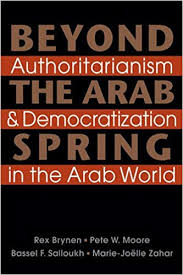 The Saudi-Iran rivalry playing out in the Middle East’s divided societies, such as the ‘proxy arenas’ of Bahrain, Iraq, Lebanon, and particularly Syria and Yemen, has cultivated sectarian difference that has both created and exacerbated existing social tensions, notes a new analysis. This has created opportunities for grassroots ‘sectarian entrepreneurs’ to capitalize with catastrophic humanitarian impact, according to Saudi Arabia and Iran: The Struggle to Shape the Middle East, a report from the UK-based Foreign Policy Centre.
The Saudi-Iran rivalry playing out in the Middle East’s divided societies, such as the ‘proxy arenas’ of Bahrain, Iraq, Lebanon, and particularly Syria and Yemen, has cultivated sectarian difference that has both created and exacerbated existing social tensions, notes a new analysis. This has created opportunities for grassroots ‘sectarian entrepreneurs’ to capitalize with catastrophic humanitarian impact, according to Saudi Arabia and Iran: The Struggle to Shape the Middle East, a report from the UK-based Foreign Policy Centre.
Given the destructive local and transnational roles played by armed sectarian non-state actors, two kinds of bargains, at both the domestic and regional levels, are required to restore a modicum of political stability in post-war reconstituted states, argues Bassel F. Salloukh, Associate Professor of Political Science at the Lebanese American University (LAU) in Beirut, and co-author of Beyond the Arab Spring: Authoritarianism and Democratization in the Arab World:
 First, there must be democratic power-sharing arrangements that cross-cut sectarian, ethnic, and tribal cleavages with interest-based ones, whether along regional or socioeconomic lines. Only this will launch the difficult process of peacebuilding, and state building and rebuilding, along a democratic path, thus reversing the erosion of the state’s ideological and infrastructural capabilities.
First, there must be democratic power-sharing arrangements that cross-cut sectarian, ethnic, and tribal cleavages with interest-based ones, whether along regional or socioeconomic lines. Only this will launch the difficult process of peacebuilding, and state building and rebuilding, along a democratic path, thus reversing the erosion of the state’s ideological and infrastructural capabilities.- Second, there must be a grand regional geopolitical bargain identifying or acknowledging spheres of influence among the main international and regional actors vying for influence in the Middle East as a means of reducing fear and perception of nefarious intent.
Sectarian politics are playing out in Iraq, where Prime Minister Abdul-Mahdi’s main political challenge will be to avoid antagonizing the two main groups that put him in office: the Sadrists and Fatah, notes Harith Hasan, a nonresident senior fellow at the Carnegie Middle East Center. Sadr has already warned that he might withdraw his support for ‘Abdul-Mahdi if the latter fails to make substantial changes, he writes for Diwan:
It is likely that Sadr will continue using his ability to mobilize the crowds to exert pressure on the political elite, perhaps threatening to join any future wave of protests, which could end up paralyzing or even toppling the government. However, while it is true that Sadr’s leverage could strengthen the prime minister’s position vis-à-vis the interest groups tied to political parties, it could also render him a hostage to Sadr’s populist impulses, which are clearly at odds with ‘Abdul-Mahdi’s generally unruffled style.
While there are links between sectarian groups and their kin in the Gulf, many of these groups exercise their own agency independent of Saudi Arabia or Iran, the FPC report adds, calling for the international community to:
- stop using sect-based groups as proxies or allies and avoid using language that reinforces divisions between communities, such as ‘Shi’a Crescent’
- resist the siren call to frame problems in terms of groups’ rights that further entrenches sectarian divides, but instead recommit to protecting the rule of law and individual rights
- do more to support grassroots projects that cut across sectarian, ethnic, social and tribal divides.
Click here to download the publication, a collaboration between the Foreign Policy Centre and the Sectarianism, Proxies and De-Sectarianisation (SEPAD) project from the Richardson Institute at Lancaster University, kindly supported by Carnegie Corporation of New York.







